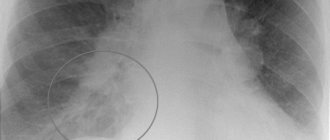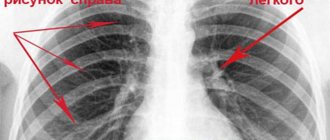Today in our country, few people pay proper attention to their health. Some people simply don’t have enough time for themselves, and some simply don’t have the desire. Fluorography is one of the most important research methods, as it allows early detection of many serious diseases of the respiratory system, one of which is tuberculosis. However, during the examination, patients are exposed to x-ray radiation, which is harmful to health. Therefore, it is very important to know how often you need to undergo fluorography. Let's look at this issue in more detail and find out how important it is to undergo examination and how often it should be done.
The role of research in modern medicine
Before we talk about how often fluorography is performed, let's first understand the general issues. Many people do not pay due attention to this examination, which can result in very serious consequences. According to medical statistics, every third person is a carrier of the tuberculosis pathogen. With good nutrition and a healthy lifestyle, the body suppresses it. However, in the event of an immune failure and due to a number of other unfavorable factors, conditions suitable for the development of the disease may be created. The main danger is that in the early stages it is asymptomatic. In this case, a person will infect everyone around him, since the virus is transmitted by airborne droplets, and it is also capable of surviving for a long period of time even in harsh environmental conditions.
Therefore, the question of how often it is necessary to undergo fluorography is very important. With timely diagnosis and initiation of treatment, it can be quickly defeated without any serious consequences for health. After all, it’s no secret that the success of therapy for any disease depends on timely diagnosis.
Should an enterprise organize fluorography for employees?
Preventive examinations are carried out within the framework of the state guarantee program for the provision of free medical care to citizens.
To undergo a medical examination, you must contact the clinic’s reception desk. Have with you: a passport, a valid compulsory medical insurance policy.
The principle of operation of film fluorography is that a special film is located behind the screen of the apparatus with which the study is performed. When X-rays pass through the human body, they subsequently fall on this film. Thus, an image of the chest organs appears on it. Modern digital fluorography poses fewer risks to human health compared to traditional film or conventional x-rays. However, pregnant women (or if there is only a suspicion of pregnancy) and children (under 15 years of age and with a height of less than 145 cm) should be careful and discuss diagnostic methods with a doctor.
The compulsory procedure, despite all the orders of the Ministry of Health, does not apply when conducting FLG. Therefore, the opportunity to refuse the procedure is provided to citizens by law, with the exception of those incapacitated and persons living in an unfavorable region. However, doing this is undesirable due to the danger of the spread of tuberculosis.
If a person had a chest x-ray more than a year ago, a referral is not required. At the place of registration, you, with a compulsory medical insurance policy and passport in hand, will be given the opportunity to undergo fluorography without a referral or additional fee.
Fluorography is mandatory for everyone. The working population does it once a year, and the non-working population - once every 2 years. In any case, the therapist will give you a referral for it if it is overdue, and you should be given a ticket to see a therapist even if it is overdue. At least that was my case!
Specialists who meet the Qualification Characteristics of Positions of Workers in the Healthcare Sector, approved by Order of the Ministry of Health and Social Development of Russia dated July 23, 2010 N 541n (registered by the Ministry of Justice of Russia on August 25, 2010 N 18247) in the specialty “radiology” are appointed to the positions of nursing staff in the fluorography room.
The authorized person, based on the lists of names, draws up a calendar plan for carrying out preventive examinations of citizens, indicating the dates and places of their conduct, the number of necessary studies, the number of citizens for each age group (hereinafter referred to as the calendar plan).
Here the question arises: what right does an organization have to demand such a procedure if they themselves did not enter into an agreement and did not issue an order and did not contact fluorography?!
For pregnant women now, if you don’t have a water bottle, then you need to carry the water bottle of your husband or someone you live with. But again, if during childbirth you still don’t have a mark indicating that you brought a flask, then you will still be admitted to the maternity hospital and will be given help, but most likely you will end up in the infectious diseases department.
Despite the variety of more modern methods for examining the lungs and other internal organs, fluorography is still the most popular.
The importance of timely examination
How often do fluorography take place? This question will be answered in detail later, but first let’s find out whether this type of research is really so important. Most people go to the hospital only after they have some kind of health problem. As for routine preventive examinations, many do not undergo it. They explain their reluctance by lack of free time and other unfounded reasons. However, no one realizes the full danger that tuberculosis poses. In its advanced form, it is difficult to treat and can also cause death. Therefore, the feasibility of passing it is quite high.
Anton Arbuzov
arbuzov.livejournal.com
Fluorography: voluntary and compulsory
Is a student required to undergo fluorography in order to be able to close the session on time?
The grounds for refusing a fluorographic examination are Art. 33 and 34 “Fundamentals of the legislation of the Russian Federation on the protection of the health of citizens” and Art. 1.7 of Federal Law No. 77 “On preventing the spread of tuberculosis in the Russian Federation.”
In accordance with these laws, a citizen has the right to refuse to undergo fluorography, and medical professionals in response are supposed to politely explain why your actions are wrong. The fact of refusal and an indication of the possible consequences of this are recorded in a special journal with the signatures of you and the medical professional.
That is, in order to be left behind, a written refusal is required.
There are situations where a medical examination is possible without a person’s consent.
There are situations when, in order to receive some free medical services, you may be required to undergo fluorography.
There are situations related to employment that require undergoing fluorography.
Which employees are required to undergo fluorography?
In this case, it is lawful to refer to Art. 213 Labor Code of the Russian Federation.
In accordance with this law, citizens who perform heavy work or work with hazardous working conditions do not have the right to refuse to undergo fluorography. At work related to traffic, as well as employees of food industry organizations, water supply facilities, medical and preventive care and children's institutions.
In adult patients, the need for fluorography is a concern due to the presence of a certain dose of radiation. The Federal Law of November 21, 2011 “On the fundamentals of protecting the health of citizens in the Russian Federation” prescribes the need for working citizens to undergo FLG in order to prevent and control dangerous infectious diseases. Therefore, you need to clearly understand when to do fluorography according to the law, and when you can refuse it.
What does the law say?
So what do you need to know about this? According to the order of the Ministry of Health of the Russian Federation number 1011, which came into force on December 6, 2012, every citizen must undergo a number of mandatory laboratory tests, which include FGT. This was done to prevent the development of the epidemic. But how often do fluorography take place according to the law? The procedure must be carried out at least once every 2 years. At the same time, each educational institution or enterprise may be subject to a separate order, on the basis of which students or workers will be required to undergo examination within a specified time frame. If working conditions are associated with increased harmfulness, then FHT may be necessary every 12 or even 6 months.
Is it legal to require a fluorography certificate for work?
Home » Good to know » Is it legal to require a fluorography certificate for work?
Good to know
04.01.2012
165 Views
When applying for a job, a person is required to submit a package of documents, including medical certificates. A certificate of professional suitability plays a special role, but some types of activities require other medical reports, for example, a certificate of fluorography.
When applying for a job, every citizen is obliged to submit to a potential employer a package of certain, specially designated documents. This documentation may vary depending on where exactly the person intends to get a job, as well as what position the person will occupy.
Among the total number of documents required for employment, medical certificates should be especially highlighted. In particular, potential employees must work at the clinic in advance and obtain medical certificates of form 086/u. This is the so-called certificate of professional suitability form. In some cases, in addition to such a certificate, some others are required. For example, a certificate of undergoing fluorography.
Every person is required to receive a certificate of fluorography once a year, regardless of what kind of life he leads and whether he is engaged in professional work at all. Let's consider whether it is legal for employers to demand that all applicants for vacant positions must receive a certificate of fluorography.
By and large, such a requirement is legitimate. The fact is that fluorography is a generally mandatory procedure. Accordingly, when applying for a job, a person is obliged not to undergo a fluorographic examination again and to obtain a certificate of completion of fluorographic examination. He can present a previously received certificate from the fluorography office. The only requirement is that these medical certificates be no older than one year. Otherwise, you will actually have to get a certificate of fluorography again.
On the other hand, only certain categories of employers are recommended to pay special attention to fluorographic examination of their employees. We are talking about the heads of institutions working with children, food, etc. Such institutions have increased requirements for sanitary and hygienic standards.
In general, it is the responsibility of medical workers to monitor the timely completion of fluorographic examination by all citizens of the Russian Federation. Moreover, even annual medical examinations are mandatory not for all categories of employed citizens, but only for certain groups of workers.
Labor legislation establishes a mandatory requirement to undergo an annual medical examination for persons engaged in work harmful to health, as well as for persons engaged in extremely difficult and difficult work. These are, in particular, firefighters, elevator operators, miners, etc. This also includes people involved in driving vehicles and machinery. People associated with food products by profession, engaged in trading activities, as well as employees of educational and training, medical and sanatorium institutions also undergo annual medical examinations. A special group consists of employees of sanitary organizations and water supply facilities. For the listed categories of workers, the certificate of fluorography, or rather its availability, is controlled not only by medical workers, but also by employers. This is established by the Labor Code of the Russian Federation. The local therapist must remind the patient orally or in writing, directly or indirectly, of the need to undergo fluorography in the near future. In turn, the employer or personnel department employees will check whether the fluorography certificate previously brought by the employee is not expired.
If the results of a fluorographic examination reveal suspicious symptoms in a particular person, then medical workers will be required to take certain measures. In particular, they will order an additional examination of the patient, based on the results of which special medical certificates will be issued. Patients with suspected open tuberculosis are temporarily suspended from work and professional activities. In some cases, he is placed in a tuberculosis clinic until he is cured. If the patient refuses hospitalization, both the medical institution and the employer can petition the court to make a decision on the forced hospitalization of the person in order to avoid the spread of infection in the community.
In general, Russian legislation does not provide for a procedure for officially refusing to undergo a fluorographic examination. In contrast, for example, to the procedure for refusing vaccination, which is at least indicated by law as a real possibility for every Russian citizen.
Fluorography is a unique method for diagnosing diseases and pathological conditions of the chest organs. Fluorography allows you to timely identify and begin to treat such a terrible disease as tuberculosis. Accordingly, undergoing fluorography is beneficial for a person for himself. Therefore, you should not perceive the employer’s requirement to bring medical certificates from the fluorography office as an imperative. This is not just a bureaucratic extravagance, but a truly useful procedure that gives you confidence in your own health. Moreover, the presence of fluorography results for everyone around you that exclude diseases allows you to feel more confident in society.
Is it possible to refuse the examination?
This aspect deserves special attention. So, we already know how often we need to undergo fluorography. But many people wonder if there is any way to legally avoid it. Despite the order of the Ministry of Health, no one has the right to force a person to undergo FGT. In addition, the following have the right to refuse the procedure:
- persons with limited physical abilities;
- people living in a region with poor environmental conditions.
However, there is no point in not undergoing examination without really compelling reasons. Tuberculosis is a very serious disease that spreads quickly and can lead to the development of an epidemic not only in the city, but also in the entire region.
Why do people want to refuse fluorography?
Now they are refusing fluorography, since data on the harmfulness of this study constantly appear in the media and on the Internet. In parallel with them, data is also appearing on the spread of tuberculosis and the increase in the number of patients with it, but many people, as usual, are hoping for a “Russian maybe.” After all, it’s not their family members who have tuberculosis, so why receive an extra dose of radiation? It is better to refuse fluorography.
But refusing to undergo fluorography is not so easy.
Indications for undergoing FGT
Let's look at this aspect in more detail. It was described above how often fluorography is performed. According to the law, every person must be examined for tuberculosis at least once every two years. In some cases, FGT is mandatory.
Main indications for the procedure:
- teenagers over 15 years of age;
- adults;
- to all family members in which there is a pregnant or recently given birth woman;
- HIV-infected;
- with pneumonia;
- tuberculosis;
- pleurisy;
- various diseases of the cardiovascular system;
- lungs' cancer;
- drug addiction.
In any of the above cases, examination is mandatory. It allows you to assess the health status of patients in order to identify concomitant diseases and draw up the most appropriate treatment program. How often can I undergo fluorography? It all depends on the specific problem. In some cases, screening may be necessary every six months.
Frequency of fluorographic examination
According to the law of the Russian Federation, the working population is required to undergo a study at least once a year.
Based on the results, a conclusion is issued, which is required upon admission to an educational institution and military service, upon employment, and treatment in an inpatient department.
There is another category of the population that is required to undergo fluorographic diagnostics in an intensive mode, usually every six months. This group includes:
- medical personnel;
- mining workers;
- employees of hazardous production.
Undergoing fluorography several times a year is considered a justified preventive measure, since the chance of developing pulmonary pathologies in this group is high.
Contraindications for PHT
It is advisable to familiarize yourself with this aspect first. This method of hospital research is not always acceptable. It is strictly contraindicated in the following cases:
- children under 15 years of age;
- women who are pregnant or breastfeeding;
- seriously ill people who, due to certain health problems, cannot physically hold their breath;
- disabled people who are unable to stand on their own.
It is worth saying a few words about the elderly. Many people are interested in how often pensioners should undergo fluorography. The same rules apply to them as for adults. Therefore, FGT can be performed once a year in the absence of any serious pathologies that require more frequent examination.
How often do you need to have fluorography done by law?
A certificate stating that a person has undergone fluorography is required at work, at the place of study, and even upon admission to a maternity hospital (however, a certificate is needed from those who live with the woman in labor). However, more and more people are refusing the study.
Indeed, on the basis of Article 20 of the law “Fundamentals of the legislation of the Russian Federation on the protection of the health of citizens”, if you wish, you can refuse to undergo a medical procedure - and fluorography is a medical diagnostic intervention.
To refuse fluorography of a child, the document must be signed by one of the parents or guardian, although fluorography is usually not performed for children under 15 years of age. To determine active tuberculosis in children, other research methods are used - Mantoux and PCR methods. As a last resort, if you want to refuse the Mantoux test, but it is impossible to carry out a PCR analysis, a TB doctor can give an opinion based on clinical signs.
Persons with mental illnesses who have committed dangerous acts or when an epidemiological unfavorable situation is created in the region may be forced to undergo fluorography. In this case, it will not be possible to legally refuse fluorography.
Often a conflict arises due to an order from the Ministry of Health, which regulates preventive examinations of citizens. According to it, all citizens over 18 years of age must undergo fluorography once every two years, and persons whose work is related to tuberculosis patients, child care institutions and public catering establishments undergo this examination once a year. Although here there is point six, where it is written that it is still possible to refuse fluorography.
Possible health complications
Every person is interested in the question of how often they can undergo fluorography, since they are afraid of x-ray radiation. There is nothing shameful, and, in fact, there is nothing terrible about it. The thing is that the dose of radioactive radiation exerted on the human body is much less than what people receive every day from the environment. Therefore, if during the examination the picture does not work out the first time and you are prescribed a repeat procedure, then nothing terrible will happen. There will be no serious health consequences.
Is fluorography required?
There is an opinion that a person should take care of his own health, but practice shows that we visit a doctor only when a crisis occurs.
It is for this reason that there is legislation that determines the need to undergo a medical examination before entering an educational institution, and every year to undergo a medical examination for schoolchildren and government workers.
There is also a law defining the need for systematic visits to fluorography rooms. There is a federal law dated June 18, 2001.
Compulsion to undergo fluorography and the patient’s personal responsibility for undergoing it
N 77-FZ “On preventing the spread of tuberculosis in the Russian Federation”, which clearly defines the need to undergo fluorography once a year, and for some workplaces - twice a year.
At the same time, in accordance with this legislation, you have the right to refuse to undergo fluorography, and medical professionals must convincingly explain to you the error of your opinion.
That is, in fact, there should not be any mandatory requirements in this case.
How often do you need to do fluorography by law?
He will immediately say that the situation with tuberculosis in our country is very serious. It is for this reason that a federal law was issued, which determines the need to undergo a fluorography procedure at least once a year, which makes it possible to ensure the absence of tuberculosis.
At the same time, sometimes the demands for fluorography reach the point of insanity. Thus, some therapists completely refuse to see patients unless they have a photo taken. But according to the law, it is not at all necessary to do fluorography more often than once a year.
Simply, you need to put a special date stamp on your hospital record in advance to avoid possible negative aspects in the future. If you are still asked to take a new photo, then you have the right to refuse. Doctors must document the fact of refusal, as well as an indication of the possible consequences of this refusal, in a special journal.
You must sign your name in this journal. If you are refused to issue a certificate due to the lack of fluorography, then know that these actions are illegal.
How to protect your rights?
In case of urgent demands from medical workers, you will definitely need to write a special statement addressed to the chief physician, where you must indicate that you were refused to see a specialist due to your refusal to undergo fluorography. Please also indicate that, according to Art. 20 of the Federal Law of November 21, 2011
No. 323-FZ “On the fundamentals of protecting the health of citizens in the Russian Federation”, holding such events is possible only after your voluntary consent, and coercion to such actions is a direct violation of existing federal legislation.
If the chief doctor does not respond to your appeal, you can safely file a lawsuit.
The question “how to refuse fluorography?” has become relevant recently due to the fact that many public medical institutions began to require fluorography before issuing a certificate or providing medical care.
But how to refuse fluorography?
To do this, you need to write a written refusal, indicating that you have been warned about the consequences, and have it endorsed by the chief physician. It is better to do this in duplicate. If medical workers, when refusing fluorography, do not want to issue you a certificate or provide medical assistance, this is a reason to contact the prosecutor’s office.
Problems may, of course, arise at work if, due to working conditions, it is necessary to undergo a medical examination, and if, according to local laws, the absence of a fluorography mark is grounds for dismissal. To avoid conflict, you can try to undergo radiography - it is less dangerous, especially digital, gives a high-resolution image and has a validity period of three years.
Is it possible to refuse fluorography?
Of course you can. This is a citizen's right enshrined in federal law, but before you refuse, think carefully about the consequences this may lead to.
If you decide to refuse fluorography, be sure to consult your doctor and do an examination that is less dangerous to the body.
Tuberculosis is a rather insidious disease, and its symptoms are often detected too late, so prevention is the best measure.
Is fluorography required?
Source: https://berkutgun.ru/objazatelna-li-fljuorografija/
How long are test results valid?
How often do you need to undergo fluorography? It all depends on the patient’s existing health problems, as well as the type of activity. In most cases, study results are valid for 1 year. This is due to the fact that the development of tuberculosis occurs on average in 6-12 months. However, a certificate may be required in one of the following cases:
- upon admission to a higher education institution;
- during employment;
- before an upcoming surgical operation;
- during conscription into the army.
In addition, the result of passing FGT is also necessary to visit public swimming pools and sports complexes.
But how to refuse fluorography?
To do this, you need to write a written refusal, indicating that you have been warned about the consequences, and have it endorsed by the chief physician. It is better to do this in duplicate. If medical workers, when refusing fluorography, do not want to issue you a certificate or provide medical assistance, this is a reason to contact the prosecutor’s office.
Problems may, of course, arise at work if, due to working conditions, it is necessary to undergo a medical examination, and if, according to local laws, the absence of a fluorography mark is grounds for dismissal. To avoid conflict, you can try to undergo radiography - it is less dangerous, especially digital, gives a high-resolution image and has a validity period of three years.
In what cases is the certificate valid for 6 months?
Current legislation identifies a separate category of persons and professions, whose representatives must undergo mandatory medical examination more often than other citizens. These include:
- teachers;
- doctors;
- military personnel;
- kindergarten teachers;
- maternity hospital workers;
- former prisoners;
- people at increased risk;
- migrants;
- people from problem families;
- homeless people;
- people with severe respiratory pathologies.
This is due to the fact that their working conditions are associated with an increased risk of contracting tuberculosis and developing lung cancer. Therefore, they should take their health more seriously and be examined more often for any diseases.
Law of the Russian Federation on the need for fluorography
Law No. 77 of 2001 “On the Prevention of Tuberculosis in the Russian Federation” is often mistakenly considered to be a regulatory document.
In fact, the document does not contain information about undergoing fluorographic examination for the purpose of preventing respiratory tract diseases. In the Russian Federation, since 2012, another regulatory act has been in force under number 1011N “Procedure for conducting a medical examination.” The law is aimed at diagnosing respiratory pathologies as early as possible and prescribes testing for persons over 18 years of age, 1 rad (10 mSV) every two years.
How the research works
Above we discussed in detail how often fluorography is performed. Now let's take a little look at its main features. Unlike other modern types of laboratory tests, FGT does not require preliminary preparation. A person simply comes to the hospital, enters the office, undresses to the waist, leans his chest against the device screen and holds his breath for a while. The procedure lasts only a few seconds, and the results of the study will be ready the next day. In some cases, when there is no time to wait, for example, if an emergency operation is necessary, you can pick up an image with a conclusion within 30 minutes.
How many times a year can fluorography be done?
In fact, the norm is general medical examination, i.e. medical examination. Certainly in government agencies. That's when everything goes away. And one more thing - don’t you have a policy?
In addition, a certificate of undergoing X-ray fluorography is often required when applying to a medical institution, conscription into the army, studying at a university and high school. If pregnant women or newborn children live with you, you may also be asked for a certificate.
The fluorography room is equipped with special equipment and diagnostic equipment in accordance with Appendix 12 to this Procedure. The information is provided for informational purposes only. Do not self-medicate. At the first sign of disease, consult a doctor.
How to neutralize the negative effects of X-rays?
If you are afraid that radiation will cause any serious complications, you can play it safe. So, for example, after undergoing the next FGT, you should take any of the following medications:
- "Polyphepan".
- "Calcium magnesium plus zinc."
- "Activated carbon".
- Dietary supplements containing calcium and iodine.
In addition to medications, there are a number of food products that neutralize any type of radiation, including radioactive radiation. These include:
- grape juice;
- honey;
- red wine;
- seaweed;
- quail eggs;
- rice;
- whole milk;
- sea fish;
- fresh fruits;
- vegetable oil;
- dried fruits.
These foods contain large amounts of vitamins and vital minerals, so they are recommended to be consumed daily. This is especially true for people with immunodeficiency and various serious diseases.











